Premature babies Skylar and Theo celebrate their first birthday
A Melbourne woman had to say goodbye to two of her four babies. This week Skylar and Theo beat the odds to reach their first birthday.
National
Don't miss out on the headlines from National. Followed categories will be added to My News.
Exclusive: Miracle babies Skylar and Theo this week celebrated a first birthday their parents thought might never come.
But the joy at their survival is tinged with sadness because their two siblings did not make it.
Parents Rachel and David Birchall still mourn that fateful day last year when they were essentially given Sophie’s choice.
“It’s always going to be the unknown, what could have been. I look at my kids now and think we could have had two more of these beautiful children, but we don’t,” Rachel said.
Rachel had fallen pregnant with four babies through fertility treatment, but health complications meant she had to say goodbye to two of them.
The surviving babies endured a torrid time — essentially left fighting for their lives after being born prematurely at 24 weeks.
They were resuscitated at birth, then dealt life-threatening staph and stomach infections.
Little Skylar developed meningitis and nearly died multiple times.
As if that wasn’t hard enough to watch as a parent, Rachel endured much of the ordeal solo, as Covid restrictions in her hometown of Melbourne saw her cut off from relatives and support.
“We’re just grateful that they’re here and fine, crying and eating and throwing their spoons, trying to crawl, trying to climb, everything,” she said.
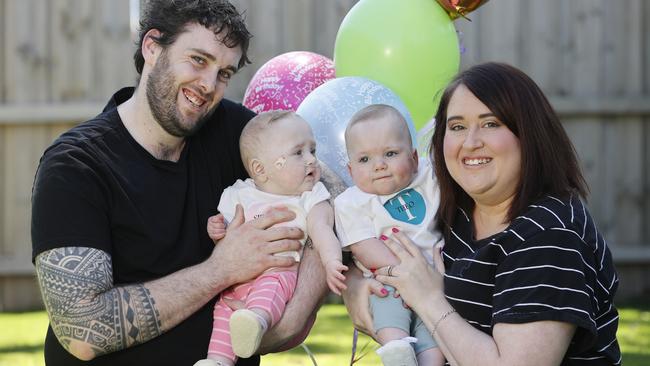
FALLING PREGNANT
Battling Polycystic Ovary Syndrome and Type 2 diabetes, the 29-year-old accounts administrator from Sunbury, faced an uphill battle conceiving in the first place.
Three rounds of a fertility treatment involving hormone injections had not worked, so she and husband David aged took off for Bali in early 2020, hoping it might help them reset.
Unfortunately, newly-introduced Covid restrictions forced them to quarantine for two weeks on their return, delaying a fourth round of treatment.
Then further coronavirus restrictions stopped all couples from starting new cycles of fertility treatment.
“We had to wait a bit longer and we kind of took that as we needed this break, my body needed to rest, we’ve been on it (fertility treatment) for a year, nothing was happening,” said Rachel.
Eventually the couple was able to give the treatment one last shot and, in April, Rachel fell pregnant.
“And then we went to my gynaecologist and she had a very worried look on her face because she obviously found the four heartbeats,” Rachel said.
“It was obviously a massive shock, we were not expecting it. I burst into tears.”
LETTING TWO GO
Rachel’s diabetes and health problems meant the multiple pregnancy was a huge risk for her and the babies who faced a high chance of premature birth and disabilities.
On medical advice, the couple eventually made the gut-wrenching decision to terminate two of the babies in the hope it might improve the chances the other two would survive.
“It will always be the worst day of my life. Sadly, because of Covid, David couldn’t come with me so I had to do this by myself,” said Rachel.
“The hospital wouldn’t let him up, even to walk me to the clinic which was very, very hard, and the procedure is done while you’re awake so no support there which was terrible.”
Even as she celebrates the achievements of her beautiful babies, Rachel still mourns the decision she and David, 31, were forced to make.
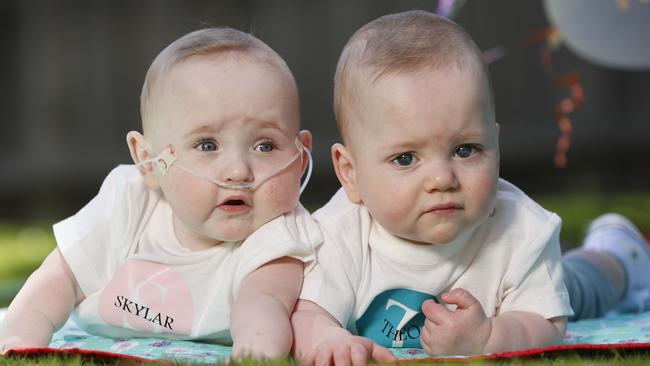
PREGNANCY WOES
The torture continued for Rachel who suffered severe vomiting throughout her pregnancy — she was unable to eat anything without a tablet to stop her throwing up.
Then, her 21 week scan revealed an unexpected problem.
Her cervix had shortened to half a centimetre which meant her surviving babies were at risk of premature birth.
A doctor put a stitch in the cervix to try to save the pregnancy.
“He said to me if we didn’t do this today, you would have given birth tomorrow, and that would have been at 21 weeks so those babies will not survive,” she said.
Each year in Australia almost 26,000 babies (8.6 per cent) are born prematurely but most will be born at 32-36 weeks gestation.
Two thirds of babies born at 24 weeks gestation who are admitted to a neonatal intensive care unit (NICU) will survive to go home.
Around one third of them will develop a significant disability such as intellectual disability, cerebral palsy, blindness or deafness.
Rachel had to spend the next four weeks on her back in a hospital bed in a desperate attempt to keep the pregnancy going as long as she could.
Covid restrictions meant only her husband could visit and only for two hours a day.
“It was very hard, very lonely time that’s for sure,” she said.
DECISION TIME
The next hurdle came when one of Rachel’s regular scans showed her baby girl was struggling to receive blood from the placenta.
By the time I got back to my room from the scan, the doctors were already waiting for her and she had to make another terrible decision.
Should she let a third baby die to give the remaining embryo its best chance of survival?
“I made it very clear there’s no way I’m letting one baby die for the other one,” she said.
Fortunately the blood supply improved and on the day before Rachel was about to be discharged from hospital to continue the pregnancy at home “our baby girl had other plans”.
“She broke her waters that night. And I went into labour,” said Rachel.
“I believe everything happens for a reason and Skylar needed out. She obviously wasn’t coping on the inside and she’s like ‘I’ve got to get out of here’,” she said.
The babies were delivered by caesarean section at 24 weeks and five days.
“I didn’t get to see them, they were rushed out quickly in plastic bags and sent up to them to Neonatal Intensive Care Unit (NICU) and I had to wait a good six hours before I was able to see them.”
The tiny babies were the length of a ruler. Skylar weighed 522 grams; Theo, a marginally-heavier 570 grams.
“They were very, very tiny, but to me they were perfect. I didn’t even really notice how small they were until a few days, went past,” Rachel said.
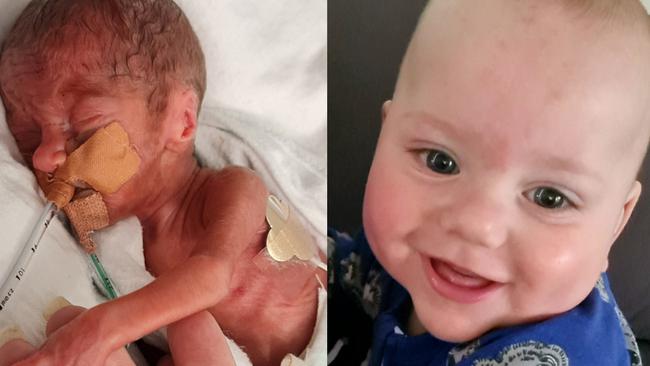
MEDICAL CHALLENGES
Both babies had to be resuscitated several times at birth but that was just the start of their complicated battle to survive.
They required oxygen and feeding tubes.
Both children contracted staphylococcus infections and a condition called necrotising enterocolitis (NEC), where sections of the bowel tissue die.
Luckily antibiotics controlled the NEC in both babies but they also contracted Streptococcus B infections and in Skylar this turned into meningitis which attacked her brain and caused seizures.
Her treatment involved another four weeks of antibiotics and this meant she had to stay in hospital while her brother Theo was allowed home 136 days after he was born.
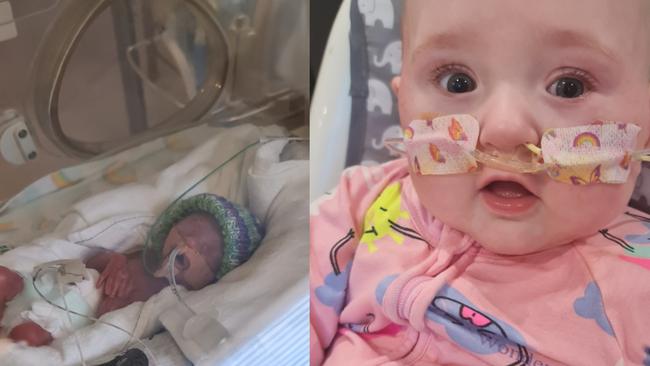
Skylar’s condition improved and she was well for two weeks.
But then came the news Rachel and David had been dreading — doctors informed them one morning she had taken a turn for the worst.
“We rushed in to the hospital and there’s about 15 nurses and doctors standing around Skylar and they rolled her over, and she had this big bruise on the side of her face,” Rachel said.
She had gone into septic shock caused by the meningitis infection which had been hiding in her heart and doctors told her parents “this is where you have to say goodbye”.
“This was over Christmas as well, right over Christmas so the hardest time,” said Rachel.
But there was one doctor who would not give up.
“We had this one consultant that looked after us and she’s like, no, not the time yet. I will let you know when it’s time.”
The tiny girl rallied and pulled through the infection but then faced one more challenge. Her parents were told if Skylar could not come off her ventilator tube they would have to let her pass away.
Doctors threw every medication they could at the task and it worked and 150 days after she was born Skylar came home for the first time.
She is likely to have suffered brain damage from the meningitis and has lost partial hearing in her right ear but her mother says “she’s a tough little cookie to prove everyone wrong because that’s what she’s done the whole time”.
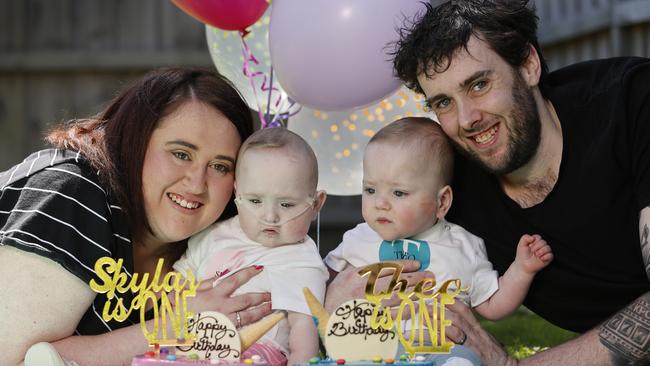
LIVING FOR THE FUTURE
This past week Rachel and David finally feel they have got to the other side of their ordeal.
“My husband and I don’t live in the past. We’re just living in the now, enjoying it now and don’t let the stuff that happened in the past affect us,” Rachel said, as she prepared for first birthday celebrations, complete with balloons and cake for the dynamic duo.
“Every day is pretty amazing. I’m worried that Skylar is not rolling and then she starts rolling all over the floor, Theo is trying to stand and he’s pulling himself up on things and you know they kicking goals and it can’t get much better than that.”
Skylar and Theo’s paediatrician Dr Sarah McNab from Melbourne’s Royal Children's Hospital said “it’s exactly patients like this, exactly children like this that are the reason why I do paediatrics”.
“They are absolute miracles, and it has been a real pleasure to watch how they’ve developed,” she said.
Acknowledging the “very scary” journey the babies’ parents faced, Dr McNab said Skylar in particular had a difficult journey with meningitis, an infection of the fluid around the brain, and endocarditis, which is an infection on the heart, as well as an infection in her bowel.
“The first time I saw Skylar smile was this absolute joy. It’s an enormous journey for families and it’s a privilege to be able to be involved with their care,” she said.
While Skylar had ongoing challenges with development, the babies were making really impressive gains.
“They’ve both learned to sit, they’re both starting to crawl and they are both babbling and making beautiful little chatting noises with us,” Dr McNab said.
“It’s an absolutely incredible testament to her strength and her family’s resilience and the amazing work at the Royal Women’s Hospital during their neonatal period.”
On Sunday, Australia’s premier support group for premature and sick babies Life’s Little Treasures Foundation is running its twelfth Walk for Prems to raise funds for its support services.
If you would like to donate or take part in the walk please visit Walk for Prems 2021
Originally published as Premature babies Skylar and Theo celebrate their first birthday





